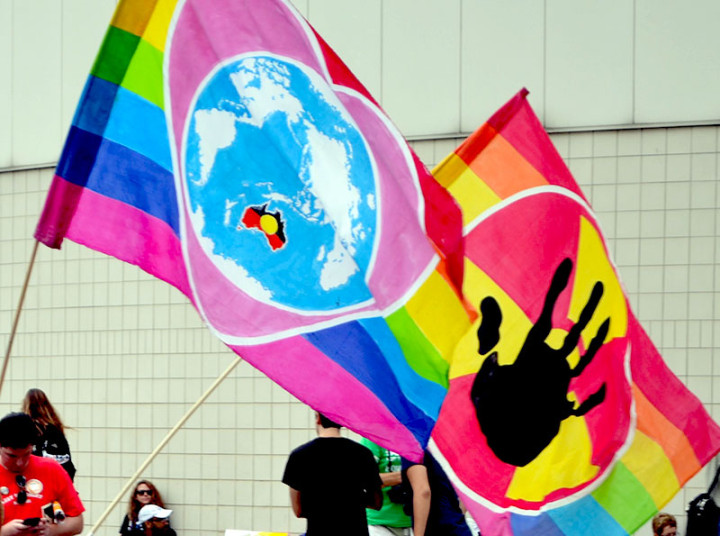Pope Francis’ encyclical Laudato Si, is an urgent call for a world-wide dialogue on the defining issue of the 21st century: climatic change and the future of the planet. The Papal encyclical builds upon the tradition of Catholic thought on social justice, climatic science, and contemporary social science research in making the case that the global ecological crisis is a moral and economic issue.
The Pope’s encyclical indicts market-based globalization, the long-standing belief in the fruits of technological progress, and the systemic profit-driven logic that engenders growing levels of economic inequality and ecological devastation. This forceful criticism of the existing global economic system ensures Pope Francis a place in history as a major dissenting voice on contemporary capitalism and its impact on the ecological crisis and global social justice.
Taking a systemic and critical approach, the encyclical analyzes climatic change within the context of globalization, technology, and the growing levels of economic inequality. In effect, the document views the ecological crisis as a set of interrelated problems that flow from the systemic dynamics of a finance-based global political economy that favors short-term speculative profits over people, and threatens the planet’s collective future. Simply put, market-driven globalization, technology and inequality are the basic pillars that have jointly generated the ecological crisis.
GLOBALIZATION: Globalization is not a new phenomenon; it has a long history of colonial domination and economic plunder. The current phase of globalization has resulted in the expansion of a relentless and predatory form of corporate capitalism. Globalization, both old and new, has been justified as the expansion of a “civilizing mission” that spreads the fruits of socio-cultural and technical progress. Nonetheless, according to the encyclical, unregulated and profit-driven corporate globalization has undermined local economies, fostered growing levels of economic marginalization, devastated local cultures, and fundamentally damaged the planet’s complex and fragile ecology. In brief, corporate globalization has been built on the fault lines of exploitation and unsustainable growth.
In the search for unregulated and predatory economic growth both people and local ecologies have been sacrificed on the corporate alter of profits. This untenable situation has led the Papacy and Catholic social thought to insist that “there is always a social mortgage on all private property.” Along these lines, the encyclical asserts that “… we need to reject a magical conception of the market, which would suggest that problems can be solved simply by an increase in the profits of companies and individuals.” In this context, the encyclical clearly places people and nature over corporate growth and profit.
TECHNOLOGY: The issue of technology and progress are two themes in the corporate storyline regarding the benefits of economic “development” and growth. Conventional corporate wisdom – designed and constructed for public consumption – argues that technology and progress are intertwined, enhance societal well-being, and are economically, socially and politically neutral. The Papal encyclical confronts this supposed technological truism by asserting that: “The economy accepts every advance in technology with a view towards profit, without concern for its potentially negative impacts on human beings.” In effect, technology and progress – which is defined as the expansion of global corporate activities – delivers a set of linked consequences that are ecologically untenable, socially disruptive, and morally suspect.
The use of advanced technology in the growth of corporate agroindustry has jumpstarted the volume of exports from the global south. Nonetheless, this form of unbalanced and inequitable growth has increased the concentration of land ownership, encouraged the use of ecologically noxious industrial fertilizers, depleted scarce water supplies, and triggered the growth of poverty stricken mega cities, while fueling displacement and global migration. The end result is a growing ecological and social crisis that depletes nature’s bounty, unduly penalizes the world’s poor, and increases political instability. In the words of the encyclical “… once certain resources have been depleted, the scene will be set for new wars, albeit under the guise of noble claims.” This clearly is a dark and dismal scenario. Yet, considering the emerging scramble for scarce resources, it is not an unlikely possibility.
While, the encyclical paints an overarching and frontal critique of the global economy, it does not offer any programmatic suggestions for ameliorating the current climatic crisis. Rome’s narrative merely proposes to open an inclusive bottom-up discussion on this pressing global problem. Be that as it may, the encyclical states, in no uncertain terms: “We need … to think of containing growth by setting some reasonable limits … before it is too late.” Which begs the question: Has the planet reached the ecological tipping point? As things currently stand, we will know the answer to this crucial question very soon.
Arturo Ignacio Sánchez, Ph.D. is chairperson of the New Yorkers Committee of Queens Community Board 3. He has taught courses on immigration, entrepreneurship, and globalization at Barnard College, The City University of New York, Columbia University, Cornell University, and New York University.






